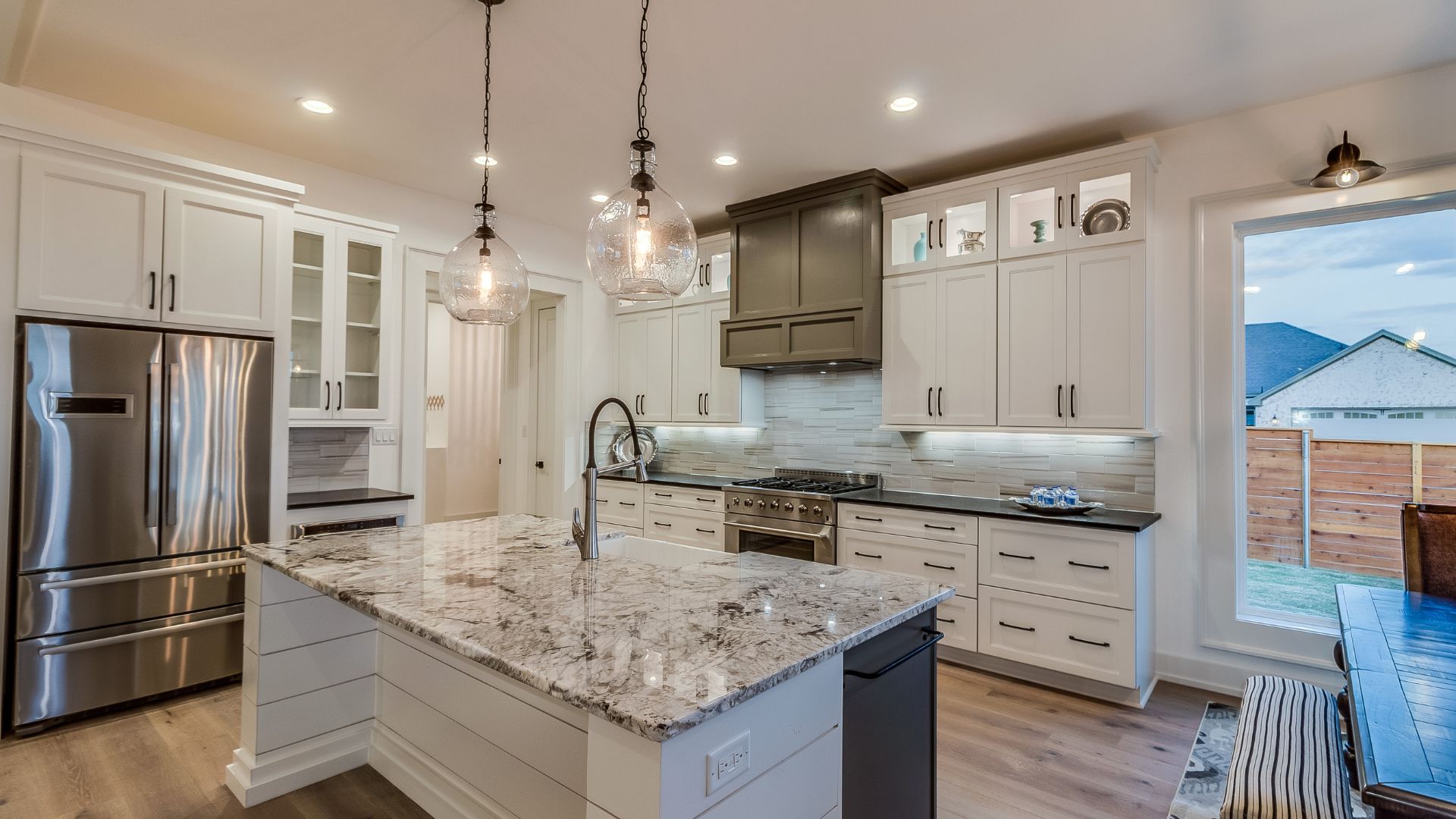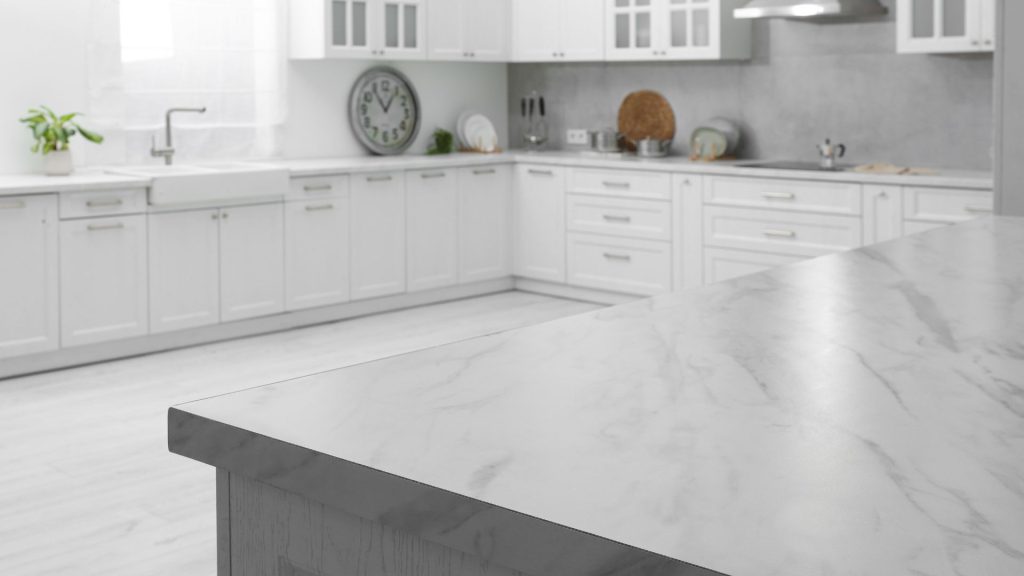Selecting the right materials for your kitchen countertops is crucial for both the functionality and aesthetic appeal of your cooking space. Kitchen countertops are not only a focal point of kitchen design but also a primary work surface. Therefore, the material you choose must be durable, attractive, and suitable for your lifestyle and cooking habits. This guide will walk you through a variety of materials, helping you weigh the pros and cons of each, so you can make an informed decision tailored to your kitchen needs.
The range of available materials has expanded significantly, offering homeowners a wide array of options from traditional natural stones to modern composites and eco-friendly choices. Choosing the right countertop involves considering several factors including durability, maintenance, budget, and style. This blog post will provide detailed insights into each factor, ensuring you choose a countertop that not only looks great but also stands the test of time.
Factors to Consider Before Choosing Countertop Materials

Before diving into the vast sea of countertop materials, it’s important to assess certain key factors that will influence your decision. Durability is paramount; the kitchen is a high-traffic area, and the countertop material needs to withstand heavy use. Maintenance is another crucial aspect—some materials require more upkeep than others, which can be a deciding factor for busy homeowners.
Budget constraints can also steer your choice. While you might admire the look of marble, quartz might fit your budget better and offer similar aesthetic appeal. Additionally, think about how the countertop will mesh with your kitchen’s current or planned usage and style. It’s not just about the material’s cost but also about its longevity and how it complements other elements in your kitchen.
Overview of Popular Countertop Materials
When it comes to popular choices, granite, quartz, and marble are often at the top of the list for many homeowners. Granite is renowned for its unique natural patterns and robustness, making it a great choice for high-use areas. It does require periodic sealing to prevent stains. Quartz, being engineered stone, offers a more uniform appearance and is easier to maintain than granite, as it doesn’t require sealing.
Marble, with its distinctive veining and timeless appeal, adds a touch of luxury to any kitchen. However, it is more porous than granite and quartz, making it susceptible to stains and scratches. These materials each have unique qualities and drawbacks, so understanding their characteristics can help you make a choice that fits your aesthetic desires and practical needs.
In-Depth Analysis of Each Material
Delving deeper into each option, granite countertops are ideal for those who use their kitchen frequently. It is highly resistant to heat and scratches, although its porosity requires regular sealing to prevent stains. Granite offers a wide variety of colors and patterns, ensuring no two countertops are exactly alike, which many homeowners appreciate for its natural beauty.
Quartz is an engineered product, combining natural quartz with polymer resins, making it extremely tough and virtually maintenance-free. It does not require sealing and is resistant to staining, which is perfect for busy kitchens. The wide range of colors and patterns available in quartz allows it to mimic the look of natural stone while providing enhanced durability. Marble, while not as hardy as granite or quartz, is preferred for its unparalleled natural veining and depth. It’s particularly popular in lower-traffic areas or baking zones where the cool surface is ideal for dough rolling.
Comparing Costs and Longevity
The cost of kitchen countertops can vary widely based on the material. Granite and quartz generally fall within the same price range, but the cost can escalate depending on the color and uniqueness of the slab chosen. Marble tends to be more expensive and is seen as a luxury material. When considering cost, also think about longevity. Investing in a higher quality material that may cost more upfront could save money in the long run due to its durability and less frequent need for replacement.
It’s also worthwhile to consider the return on investment (ROI). Materials like granite and quartz often increase home value, appealing to potential homebuyers should you decide to sell your home. Cheaper materials might not add as much value but could be a cost-effective solution for tight budgets or short-term solutions.
Aesthetic Considerations
Your countertops play a pivotal role in defining the kitchen’s overall look. Matching your countertops with kitchen cabinetry and flooring can create a cohesive and harmonious design. Consider the cabinet colors and styles—darker woods might call for lighter countertops for balance, and vice versa. Also, the edge style of the countertop (beveled, rounded, square) can significantly influence the kitchen’s feel, from sleek and modern to traditional.
Textures and finishes vary widely and can influence the kitchen’s style and maintenance. Polished finishes are easy to clean and enhance the color and pattern of the material, while honed and leather finishes offer a more matte look that may hide scratches and fingerprints better.
Maintenance and Care for Countertops
Proper maintenance extends the life of your countertops and keeps them looking new. Granite countertops require sealing at least once a year to maintain their non-porous surface. Quartz, on the other hand, needs only basic cleaning with soap and water or a mild detergent.
For marble countertops, immediate cleanup of spills is crucial to prevent staining, and using cutting boards and trivets is advised to avoid scratches and heat damage. Regular care involves cleaning with a soft cloth and a pH-neutral cleaner designed for marble. Regular attention ensures these surfaces remain pristine and damage-free.
The Environmental Impact of Countertop Materials
Today’s homeowners are increasingly concerned with the environmental impact of their choices. Sustainable materials like recycled glass or bamboo offer environmentally friendly alternatives with unique aesthetics. If sustainability is a priority for you, consider materials that have a low environmental impact in terms of quarrying, manufacturing, and transporting.
Using locally sourced materials can also reduce carbon footprints while supporting local businesses. Some materials like quartz are durable and long-lasting, making them environmentally friendly in terms of longevity. Discussing options with suppliers about the origins and manufacturing processes can help make a more environmentally responsible choice.
Real-Life Case Studies
Examining real-life examples can provide insights into how different materials live up to everyday use. One case study involves a family who chose quartz for its durability and low maintenance, finding it ideal for their heavy-use kitchen. They reported high satisfaction with its stain resistance and the wide range of design options available.
Another case involved a couple who installed marble countertops in a seldom-used formal kitchen. They chose marble for its beauty, accepting the need for more maintenance in exchange for its striking appearance and the character it adds to the space. These examples show that the right material depends not just on aesthetic preference but also on how the kitchen will be used.
Choosing the right material for your kitchen countertops is a decision that affects the look, feel, and functionality of your cooking space. Whether you opt for the durability of granite, the maintenance ease of quartz, or the classic beauty of marble, your choice will significantly influence your kitchen’s overall design. Consider all aspects—from cost to maintenance to environmental impact—before making your final decision.
If you need more guidance or wish to see samples and finishes in person, don’t hesitate to reach out to Selective Remodeling. Our team is here to help you navigate the selection process, ensuring you find the perfect countertop material that meets your needs, preferences, and budget. Contact us today to schedule a consultation and take the next step in transforming your kitchen into a space you love.


